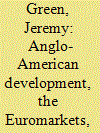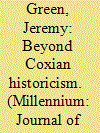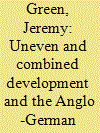| Srl | Item |
| 1 |
ID:
145509


|
|
|
|
|
| Summary/Abstract |
This article challenges existing accounts of the development of the Euromarkets by arguing that their emergence constituted the foundational moment in the advent of a postwar Anglo-American developmental field. The account contends the notion of a postwar order shaped predominantly by the outward expansion of American financial power, by deprivileging the exclusivity of American power and arguing that co-constitutive Anglo-American developmental processes were the generative force that produced the Euromarkets. Drawing upon new archival material, the article suggests that an Anglo-American developmental sphere, in which Britain continued to play a crucial but subordinate role, was key to the unfolding of postwar financial globalisation. The Anglo-American developmental processes occasioned by the Euromarkets gave rise to a ‘transatlantic regulatory feedback loop’ that stimulated deregulation on both sides of the Atlantic and placed Anglo-American capitalist interdependence at the centre of the politics of globalisation. The deeper origins of financial deregulation lie in the transformation of Anglo-American finance during the 1960s.
|
|
|
|
|
|
|
|
|
|
|
|
|
|
|
|
| 2 |
ID:
133547


|
|
|
|
|
| Publication |
2014.
|
| Summary/Abstract |
This article scrutinises Robert Cox's theorisation of 19th century world order, proposing 'uneven and combined development' as an alternative conceptual approach. I contend that Cox's understanding of 19th century world order is insufficient as it neglects the significance of German ascendance. Privileging hegemonic construction of world order, Cox's account of the decomposition of Pax Britannica reifies the neo-realist anarchy problematique. Overall, Cox exaggerates the degree of rupture between phases of world order, obscuring developmental continuities that produce different 'geopolitical' contexts. Uneven and combined development, I propose, enables a fruitful reappraisal of the period. Process-based international historical sociology is suggested as an alternative way to think about 19th century world order and critical IR.
|
|
|
|
|
|
|
|
|
|
|
|
|
|
|
|
| 3 |
ID:
113811


|
|
|
|
|
| Publication |
2012.
|
| Summary/Abstract |
This article attempts to situate the approach to World War I within the context of the uneven and combined development of 19th-century European capitalism. Through a comparative analysis of German and British development within the context of the epochal transition from feudalism to capitalism, the article proposes that existing historical materialist and Realist understandings of the roots of World War 1 are inadequate. Realist analyses, stressing the primacy of 'geopolitics', fail to provide a convincing explanation of the precise origins of German bellicosity. Instead they assume that expansionist German behaviour was an inevitable consequence of systemic anarchy. Historical materialist accounts, preferring a sociological explanation, overstate the importance of systemic capitalist crisis and the European-wide escalation of class struggle for understanding the genesis of the war. Utilizing Trotsky's concept of uneven and combined development, I contend, enables a more comprehensive understanding of the origins of the conflict.
|
|
|
|
|
|
|
|
|
|
|
|
|
|
|
|